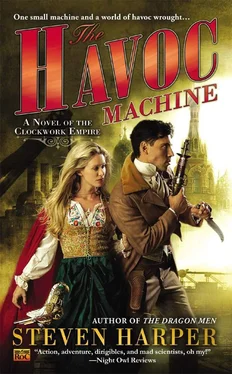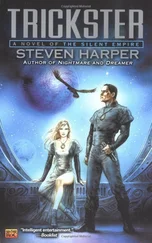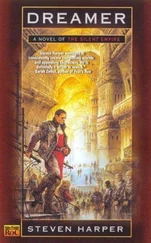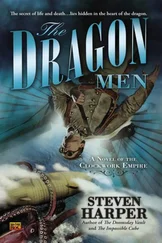Steven Harper - The Havoc Machine
Здесь есть возможность читать онлайн «Steven Harper - The Havoc Machine» весь текст электронной книги совершенно бесплатно (целиком полную версию без сокращений). В некоторых случаях можно слушать аудио, скачать через торрент в формате fb2 и присутствует краткое содержание. Год выпуска: 2013, ISBN: 2013, Издательство: ROC, Жанр: sf_fantasy_city, на английском языке. Описание произведения, (предисловие) а так же отзывы посетителей доступны на портале библиотеки ЛибКат.
- Название:The Havoc Machine
- Автор:
- Издательство:ROC
- Жанр:
- Год:2013
- ISBN:9781101601983
- Рейтинг книги:4 / 5. Голосов: 1
-
Избранное:Добавить в избранное
- Отзывы:
-
Ваша оценка:
- 80
- 1
- 2
- 3
- 4
- 5
The Havoc Machine: краткое содержание, описание и аннотация
Предлагаем к чтению аннотацию, описание, краткое содержание или предисловие (зависит от того, что написал сам автор книги «The Havoc Machine»). Если вы не нашли необходимую информацию о книге — напишите в комментариях, мы постараемся отыскать её.
The Havoc Machine — читать онлайн бесплатно полную книгу (весь текст) целиком
Ниже представлен текст книги, разбитый по страницам. Система сохранения места последней прочитанной страницы, позволяет с удобством читать онлайн бесплатно книгу «The Havoc Machine», без необходимости каждый раз заново искать на чём Вы остановились. Поставьте закладку, и сможете в любой момент перейти на страницу, на которой закончили чтение.
Интервал:
Закладка:
He eyed her over the rim of his cup. “These words have reached the streets, have they?”
“Rumors and speculation,” Sofiya said. “I know the landowners largely oppose the idea, and I myself wonder why such a wise man as the tsar would-”
“Huh!” Alexander snapped his cup down. “The landowners. They want to keep Russia in the dark ages. We are trapped with feudal ideas in a feudal economy. No other empire uses serfs in this day and age. Men must own their own land. Ownership creates pride and foments new ideas. Like Peter the Great before me, I traveled widely in my youth, and I have seen what new ideas can accomplish-navies and railroads and telegraphy and airships and electric power. None of these things were invented in Russia. Our people are stifled, and it’s to the good of the country that they are granted the freedom to do as they wish.”
This was clearly an old argument, but it had steered the conversation away from clockworkers. Thad shot Sofiya a grateful look, which she now ignored.
“So the rumors are true?” Sofiya asked pleasantly.
“You are too blunt for court, my dear,” the tsar said. “Your attempts to tweak information out of me are blatant. But everyone already knows. My legal scholars are drawing up the ukaz as we speak. When the new law is finished and signed-probably sometime in January-the serfs will be freed of their obligations to the landowners. Except for taxes, of course. No empire can run without taxes.”
“Is it possible, then,” Sofiya continued, “that the person who planted the bomb was a landowner who doesn’t want you to accomplish this feat?”
Alexander stroked his chin. “The thought had occurred. Do you have information about it?”
“Only speculation. It is why I-”
The door burst open, and General Parkarov dashed into the room with a box in his hands. He gave a perfunctory bow before the sovereigns. “Your Majesties. I have news of the investigation.”
The tsar half came to his feet. “What did you find, General?”
“These.” From the box he extracted two spiders, or what was left of them. They had been blown to pieces. He laid them on a table. Thad recognized them as ones that belonged to Mr. Griffin. His skin went cold despite the heat of the room.
“We found these bits in the Nicholas Hall.” he said. “Two working spiders escaped us. They are not ones employed by the Winter Palace.”
“Did they plant the bomb?” Alexander asked.
“I am certain.” The general’s eyes glittered as he spoke. “I inspected the throne room myself before you entered, and there was no bomb. No one approached the throne after my inspection, so it must have been these spiders who planted it, sent by a rogue clockworker. We must find him before he strikes again.”
“This is not necessarily-” Sofiya began.
“Do that,” Alexander ordered. “Whatever it takes. Send your men. Search the city. Bring him-or her-in.”
“Majesty.” Parkarov bowed and withdrew.
Sofiya looked like she wanted to say more, but the tsarina said, “Disgusting! Horrifying that some monster out there wants to murder my children!”
This time the tsar patted her hand. “We’ll find him, my dear. And then we can watch the machines tear him to pieces, as he deserves.”
“Ser, I wonder if you’ve considered-” Sofiya began.
“Mr. Lawrenovich,” Maria interrupted, turning to Thad, “you’re an expert at hunting clockworkers down.”
Uh-oh. Thad could see where this was going. He flicked his eyes toward Sofiya, but she just shook her head helplessly. “I…yes,” he said, trying to think.
“Then join the men,” she said. “Use your skills. Find that clockworker for me. And kill him.”
* * *
The machine was enormous now, both physically and mentally. Its body had added so many memory wheels and creation devices that it could no longer move about. It squatted at the intersection of five tunnels, taking in more and more and more metal, whatever the spiders could bring. It controlled a great many spiders. They skittered about the tunnels and the city above, giving the machine a perfect picture of the place. Half a dozen spiders were stealing books from the engineering section at the Library of the Russian Academy of Sciences and flipping through them at blinding speed, transmitting words and concepts to the machine, then leaving them about for the puzzled men in the library to reshelve. Already there was talk of hauntings and poltergeists, despite them being men of science. The Master did not mind as long as the machine and the spiders were not caught.
The machine sent tentacles of wire and pipe through the tunnels. This was one of the few places in Saint Petersburg that actually had tunnels, an attempt on behalf of the Academy at a sewer and cargo transportation. The high water table meant tunnels were difficult to dig and expensive to maintain, however, and the project had been abandoned. The machine had taken advantage of the train tracks already laid down to transport the materials it needed, especially metal and books.
Many of the books were written by people called clockworkers. These clockworkers were held in a prison in the Peter and Paul Fortress on yet another River Neva island of the sort Saint Petersburg seemed to be prone. Most of the books hadn’t been written so much as dictated, and some of them rambled rather a lot, though their insights into physics and engineering and clockwork technology were proving invaluable, and they allowed the machine to continue its improvements. The clockworkers seemed to interest the Master very much, though he seemed to espouse no interest whatsoever in the clockwork plague that spawned them. The machine noted both these facts without emotion and continued its research and its improvements.
By now, the main part of the machine occupied the entire rather large intersection of the five tunnels beneath the Academy, and it no longer resembled a spider with ten legs, but was instead a chaotic mass of pipes and gears and boilers and claws and wheels and belts and mechanical hands. A cabinet that resembled a small brass wardrobe stood prominent in the center of this mass. The doors stood tightly shut. Next to it, a twisted chute coiled to the ground. The machine chuffed and puffed, and from an aperture at the top of the chute emerged a spider, gleaming and new. It spiraled down the chute and clattered to the concrete floor of the tunnel. It stumbled about drunkenly, then righted itself and scampered about as if excited. It bobbed on its new legs and made a squeaking sound. The machine chuffed and puffed again, and a second spider spiraled down the chute to land near the first. It also staggered. The first spider recoiled for a moment, then scampered over to investigate. The second spider came fully upright and, like the first spider, bobbed up and down, exploring its legs. The first spider extended a leg to touch the second. Abruptly, the second leaped on the first and tore at it with all eight of its own legs. The first spider squeaked in dismay and tried to disentangle itself, but to no avail.
The machine extended two mechanical hands, plucked the two spiders apart, and held them wriggling at a distance from each other. The second continued its attempted attack on the first, and the first recoiled in the machine’s grip. Aggression. Interesting.
The machine tossed the first spider into a hopper, sucked it inside, and crushed it to squeaking pieces. The second spider wriggled furiously in the machine’s hand until the machine set it down, whereupon it rushed about in angry circles. The machine exuded a third spider. This time, both of them fought until the machine sent a signal of its own that stopped them. The spiders came reluctantly under control even as the machine exuded a fourth aggressive spider.
Читать дальшеИнтервал:
Закладка:
Похожие книги на «The Havoc Machine»
Представляем Вашему вниманию похожие книги на «The Havoc Machine» списком для выбора. Мы отобрали схожую по названию и смыслу литературу в надежде предоставить читателям больше вариантов отыскать новые, интересные, ещё непрочитанные произведения.
Обсуждение, отзывы о книге «The Havoc Machine» и просто собственные мнения читателей. Оставьте ваши комментарии, напишите, что Вы думаете о произведении, его смысле или главных героях. Укажите что конкретно понравилось, а что нет, и почему Вы так считаете.












